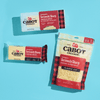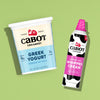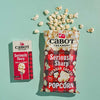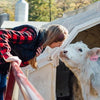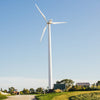
FarmLove – UConn Dairy Program
Their school mascot may be a husky, but the University of Connecticut animal science department has a fond spot for dairy cows, too. More than 90 of them, in fact, make up the university’s milking herd and make UConn one of several teaching farm members of the Cabot co-op.
The Huskies love their cows and farmers so much that at four of the highly ranked women’s basketball team’s games this season, attendees can sample Cabot cheese. And at the February 9 game, dubbed “Farmers’ Day,” farmers in attendance will be recognized in center court.

Educational dairy herds like UConn’s well-established program play a critical role enabling students to get hands-on agriculture experience and also directly connect classroom learning with real-life examples. “With fewer and fewer students coming from farms, a lot don’t have that exposure before they get here,” explains Mary Margaret Cole, executive program director in the school’s animal science department.

The dairy herd at UConn benefits about 400-500 animal science and pre-veterinary students a year between those who have paid jobs working with the herd, to the classes from dairy management to animal behavior that come with their professors. In addition, both undergraduate and graduate researchers rely on the herd to study topics like better disease management and how bedding composition can be optimized for comfort and cleanliness.

This past year, the school’s dairy program took a significant leap forward when it invested in two robotic milking systems, among the first educational herds in the country to do so. The previous milking parlor was very labor-intensive and expensive to run, explains Mary Margaret. There was also a huge upside, she proposed when she brought the idea forward, for students to “learn to manage a herd on the cutting edge of technology.” In addition to improved efficiencies, the rich set of data gathered by the robots would be of huge educational value, Mary Margaret believed.

The carefully planned transition took place in May of 2018 and has gone very smoothly. The barn was already free-stall, allowing cows to move around freely, so the two different robots were simply installed at each end. Most of the cows quickly learned to make their way over for milking whenever they felt the need, rather than having to wait for the humans to be ready to milk them. “It’s been easier for the cows than the people,” Mary Margaret says with a chuckle. The younger cows, especially, “took to it like a duck to water,” she says, noting that the 25 Jerseys in the mixed herd have even shown increased productivity.

Katy Davis, a senior from central Connecticut, is among the 10 students who are trained to work with the full-time dairy staff year-round. She is completing her degree in agriculture and natural resources and will be going on to get her master’s in agricultural education. The dairy program has been a valuable part of her college education, she says: “I really like the hands-on learning. It’s how I learn the best.”
The students are paid for their hours working on the farm, but there is also more to be gained, Katy says. “I think working here has helped me learn a lot about the ag industry and I think that will help me when I’m a teacher,” she explains. Experiencing the shift to robotic milkers has been very interesting, Katy continues. “The data the robots collect is so helpful,” she says. “It’s so cool how they can detect udder health issues a lot better than people.” The reduction in hands-on time needed to manage milking also provides students and staff more time to step back and think about how to improve bigger picture management, she says.

Finally, Katy notes that it’s fun to be able to explain to friends, family and fellow students about the robots. “It’s cool to go to a school that is one of the few with robotic milkers,” she says. ” When we talk to prospective students, it’s a real draw. It’s great to be able to say we’re on the cutting edge.”
Check out this video of robotic milkers in action at UConn!
Follow along on Instagram at @UConnAnimalScience and @UConnDairyClub.



